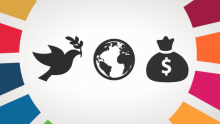After so many years of political inaction only the massed goodwill of ordinary people can bring about an end to poverty in a world of plenty through enormous and continual protests across all countries. So let’s take the path of least resistance and jointly herald the long-agreed human rights of Article 25—for adequate food, housing, healthcare and social security for all.
